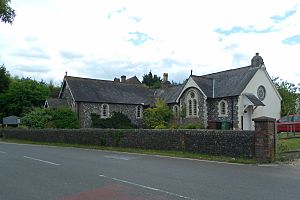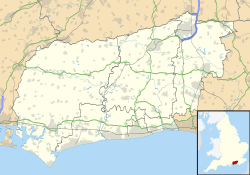Yapton Free Church facts for kids
Quick facts for kids Yapton Free Church |
|
|---|---|
| Yapton Evangelical Free Church | |

The church (left) and attached schoolroom (right) from the northwest
|
|
| 50°49′15″N 0°36′56″W / 50.820912°N 0.615601°W | |
| Location | Main Road, Yapton, West Sussex BN18 0EA |
| Country | England |
| Denomination | Evangelical |
| Previous denomination | Congregational |
| History | |
| Status | Church |
| Founded | 1861 (in present building) |
| Founder(s) | Henry Bateman |
| Architecture | |
| Functional status | Active |
| Heritage designation | Grade II |
| Designated | 20 September 1984 |
| Years built | 1861 |
Yapton Free Church, also known as Yapton Evangelical Free Church, is a Christian church located in the village of Yapton in West Sussex, England. This church is known for its beautiful building made of flint stone. It was built in 1861 for a group of people who followed the Congregational faith.
As more people joined the church, some services and activities started to be held in bigger places by the 1990s. However, the original church building is still used for worship today. Yapton Free Church is an independent church. It is also connected to a global group of churches called Partners in Harvest. The church building is very important for its history and design. Because of this, it has been officially protected as a Grade II Listed building by Historic England.
History of Yapton Free Church
People who were not part of the main Church of England, called Protestant Nonconformists, lived in the Yapton area as early as the 1600s. Records from 1676 show that six such people lived in the parish.
Groups of people who believed in Independent and Congregational ways of worship started meeting in Yapton around 1830. By 1846, a special room was officially set aside for their meetings. A new chapel might have been built in 1848 where the church stands today. Another meeting room was used in 1850.
In its early days, the Yapton church was connected to Trinity Congregational Church, Arundel in nearby Arundel. That church helped spread its message in Yapton during the 1840s. A Sunday school, where children learned about the Bible, was started by 1851.
The current church building, along with a Sunday school room attached to it, was built in 1861. A person named Henry Bateman paid for its construction. The Congregational church in nearby Littlehampton also supported the Yapton church in its early years. By 1865, the minister for Yapton came from Littlehampton. By 1886, Yapton had its own minister who lived in a house next to the church. This house was later taken down in the 1970s.
In 1973, the church changed its focus and became known as Yapton Evangelical Free Church. It adopted an Evangelical identity. By 1991, the church had so many people attending that services were held in the Yapton and Ford Village Hall. Today, the church is part of the Partners in Harvest network. This network was started in Canada in 1994 and works with independent churches around the world.
The church is officially registered for worship under the Places of Worship Registration Act 1855. Its registration number is 14693. It was also registered to hold weddings on October 20, 1887, under the name Congregational Chapel.
Church Building and Design
Yapton Free Church has an L-shaped design. It includes the main chapel and a schoolroom attached to it. It is a very attractive building. Its walls are made mostly of flint stones, which are often decorated with small stones called galleting. Some parts also have brickwork and smooth, stucco-covered stone called ashlar.
The main chapel part of the building has two sections on its front. It features a pointed roof section called a gable and a covered entrance called a porch. The sides of the chapel have windows with rounded tops. There is another entrance where the schoolroom connects to the main chapel. The schoolroom part has a single floor and three sections on its front. The middle section sticks out and also has a gable. It has a wider arched window, while the other windows are narrow.
See also
 | Shirley Ann Jackson |
 | Garett Morgan |
 | J. Ernest Wilkins Jr. |
 | Elijah McCoy |


